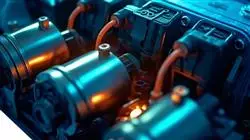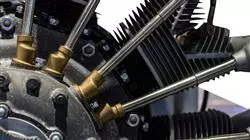University certificate
The world's largest faculty of engineering”
Introduction to the Program
A Professional master’s degree program that will allow you to be up-to-date with the current affairs in motor engineering and current optimization techniques”

Since inventors Lenoir and Otto contributed to the development of the reciprocating internal combustion engine, the techniques for its design and development have undergone significant advances. In this sense, their improvement has led to lower manufacturing costs, faster time to market and much better performance. All these characteristics have, in turn, led to the growth of sectors such as the naval, aeronautical and industrial sectors.
In this scenario, the specialized professional engineer plays a transcendental role. That's why you need to have a solid understanding of advances in injection and ignition systems, technology used for noise and vibration reduction, or improvements in data analysis for predictive maintenance. This 12-month Professional master’s degree in Alternative Internal Combustion Engines is based on these lines.
It is a program that will lead the students to carry out a deep analysis of the affected Thermodynamic Cycles, their different components, the Design, Modeling and Simulation of all of them. Furthermore, throughout this educational pathway, the engineer will delve into the different strategies with respect to the improvement of the different aspects of the engine, such as the different performances: Emissions and Fuel and Combustion possibilities.
To this end, the graduates are provided with quality multimedia pills, specialized readings, and case studies that will allow them to obtain a dynamic, top-level education that will not only provide them with solid current knowledge in this field, but will also show them future perspectives under the highest scientific rigor.
An excellent opportunity to achieve advanced learning with an excellent team of teachers and a 100% online teaching methodology. The student only needs a digital device with an Internet connection to view, at any time of the day, the content hosted on the virtual platform.
Enroll in the best digital university in the world according to Forbes and grow professionally in the world of Aeronautical Engineering”
This Professional master’s degree in Alternative Internal Combustion Engines contains the most complete and up-to-date program on the market. The most important features include:
- The development of practical cases presented by experts in Aeronautical Engineering
- The graphic, schematic, and practical contents with which they are created, provide scientific and practical information on the disciplines that are essential for professional practice
- Practical exercises where the process of self-assessment can be used to improve learning
- Its special emphasis on innovative methodologies
- Theoretical lessons, questions to the expert, debate forums on controversial topics, and individual reflection assignments
- Content that is accessible from any fixed or portable device with an Internet connection
Inquire into the latest research projects and development of new engine concepts through this university program"
The program’s teaching staff includes professionals from the field who contribute their work experience to this educational program, as well as renowned specialists from leading societies and prestigious universities.
The multimedia content, developed with the latest educational technology, will provide the professional with situated and contextual learning, i.e., a simulated environment that will provide immersive education programmed to learn in real situations.
This program is designed around Problem-Based Learning, whereby the professional must try to solve the different professional practice situations that arise during the educational year. For this purpose, the students will be assisted by an innovative interactive video system created by renowned and experienced experts.
Thanks to the Relearning method used by TECH you will achieve a much more effective learning in less time"

Delve through the best teaching materials on the use of biofuels and their impact on engine performance"
Why study at TECH?
TECH is the world’s largest online university. With an impressive catalog of more than 14,000 university programs available in 11 languages, it is positioned as a leader in employability, with a 99% job placement rate. In addition, it relies on an enormous faculty of more than 6,000 professors of the highest international renown.

Study at the world's largest online university and guarantee your professional success. The future starts at TECH”
The world’s best online university according to FORBES
The prestigious Forbes magazine, specialized in business and finance, has highlighted TECH as “the world's best online university” This is what they have recently stated in an article in their digital edition in which they echo the success story of this institution, “thanks to the academic offer it provides, the selection of its teaching staff, and an innovative learning method aimed at educating the professionals of the future”
A revolutionary study method, a cutting-edge faculty and a practical focus: the key to TECH's success.
The most complete study plans on the university scene
TECH offers the most complete study plans on the university scene, with syllabuses that cover fundamental concepts and, at the same time, the main scientific advances in their specific scientific areas. In addition, these programs are continuously being updated to guarantee students the academic vanguard and the most in-demand professional skills. In this way, the university's qualifications provide its graduates with a significant advantage to propel their careers to success.
TECH offers the most comprehensive and intensive study plans on the current university scene.
A world-class teaching staff
TECH's teaching staff is made up of more than 6,000 professors with the highest international recognition. Professors, researchers and top executives of multinational companies, including Isaiah Covington, performance coach of the Boston Celtics; Magda Romanska, principal investigator at Harvard MetaLAB; Ignacio Wistumba, chairman of the department of translational molecular pathology at MD Anderson Cancer Center; and D.W. Pine, creative director of TIME magazine, among others.
Internationally renowned experts, specialized in different branches of Health, Technology, Communication and Business, form part of the TECH faculty.
A unique learning method
TECH is the first university to use Relearning in all its programs. It is the best online learning methodology, accredited with international teaching quality certifications, provided by prestigious educational agencies. In addition, this disruptive educational model is complemented with the “Case Method”, thereby setting up a unique online teaching strategy. Innovative teaching resources are also implemented, including detailed videos, infographics and interactive summaries.
TECH combines Relearning and the Case Method in all its university programs to guarantee excellent theoretical and practical learning, studying whenever and wherever you want.
The world's largest online university
TECH is the world’s largest online university. We are the largest educational institution, with the best and widest online educational catalog, one hundred percent online and covering the vast majority of areas of knowledge. We offer a large selection of our own degrees and accredited online undergraduate and postgraduate degrees. In total, more than 14,000 university degrees, in eleven different languages, make us the largest educational largest in the world.
TECH has the world's most extensive catalog of academic and official programs, available in more than 11 languages.
Google Premier Partner
The American technology giant has awarded TECH the Google Google Premier Partner badge. This award, which is only available to 3% of the world's companies, highlights the efficient, flexible and tailored experience that this university provides to students. The recognition as a Google Premier Partner not only accredits the maximum rigor, performance and investment in TECH's digital infrastructures, but also places this university as one of the world's leading technology companies.
Google has positioned TECH in the top 3% of the world's most important technology companies by awarding it its Google Premier Partner badge.
The official online university of the NBA
TECH is the official online university of the NBA. Thanks to our agreement with the biggest league in basketball, we offer our students exclusive university programs, as well as a wide variety of educational resources focused on the business of the league and other areas of the sports industry. Each program is made up of a uniquely designed syllabus and features exceptional guest hosts: professionals with a distinguished sports background who will offer their expertise on the most relevant topics.
TECH has been selected by the NBA, the world's top basketball league, as its official online university.
The top-rated university by its students
Students have positioned TECH as the world's top-rated university on the main review websites, with a highest rating of 4.9 out of 5, obtained from more than 1,000 reviews. These results consolidate TECH as the benchmark university institution at an international level, reflecting the excellence and positive impact of its educational model.” reflecting the excellence and positive impact of its educational model.”
TECH is the world’s top-rated university by its students.
Leaders in employability
TECH has managed to become the leading university in employability. 99% of its students obtain jobs in the academic field they have studied, within one year of completing any of the university's programs. A similar number achieve immediate career enhancement. All this thanks to a study methodology that bases its effectiveness on the acquisition of practical skills, which are absolutely necessary for professional development.
99% of TECH graduates find a job within a year of completing their studies.
Professional Master's Degree in Alternative Internal Combustion Engines
Alternative internal combustion engines are at the heart of vehicle and energy innovation, powering a faster, cleaner and more powerful world. Would you like to become an expert? The Faculty of Engineering at TECH Global University offers you the opportunity to acquire these skills through the Master's Degree in Alternative Internal Combustion Engines, taught in online mode. Our program stands out for having a team of highly qualified teachers, with extensive experience in the field of engineering and engine technology. During the program, you will explore alternative internal combustion engines in depth, understanding their operation, design and applications in industry. Does the idea of mastering this essential technology in the modern world excite you? With us this is possible, plus, upon completion of the program, you will receive a prestigious certificate to endorse your expertise and knowledge in this highly specialized field.
Explore alternative internal combustion engines
Our goal is to provide you with a comprehensive and up-to-date guide to alternative internal combustion engines, so you can apply your knowledge in the automotive, aerospace and energy industries. Studying at TECH is a unique experience, where you will have access to state-of-the-art resources, cutting-edge research and a committed academic community. Can you imagine the job opportunities that will open up for you with this certificate in hand? Here, you will be prepared to work as a design engineer, engine development specialist, technical consultant or researcher in prestigious global companies and research centers. The demand for highly trained professionals in this field continues to grow steadily, giving you an exceptional competitive advantage in the job market. In short, the Master's Degree in Alternative Internal Combustion Engines offers you the opportunity to acquire exceptional skills, learn from the best, earn a recognized certificate and open doors to exciting career opportunities. Are you ready to begin your journey to engineering success? We look forward to seeing you!







